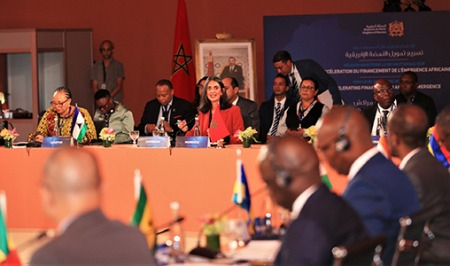
The High-Level Ministerial Meeting on accelerating the financing of Africa’s emergence, held on Thursday on the sidelines of the WB-IMF Annual Meetings, adopted the “Marrakech Declaration” which calls for a “global financial architecture that is fairer and more conducive to Africa’s development.”
In this Declaration, the 48 countries that took part in this High-Level Meeting, organized at Morocco’s initiative, called for the realization of the continent’s growth priorities, which respect the sovereignty and territorial integrity of African states and contribute to the fulfillment of its populations.
They also called for greater bilateral and multilateral cooperation to help African countries bridge the infrastructure gap, notably by increasing funding, providing and transferring technical and technological expertise, and building capacity.
Addressing donors, partners and friendly countries, the African countries also called for support for the emergence of a dynamic, wealth-creating private sector, capable of supporting the development of structuring infrastructure projects and bridging the infrastructure financing gap.
At this meeting, they invited Moroccan Minister of Economy and Finance to work towards the follow-up of the implementation of this Declaration and the creation of an inter-African Task-Force which will be made available to the countries of the Continent to share best practices and experiences in the fields of infrastructure development and financing in Africa, to assist in the development of structuring and bankable infrastructure projects, and to support African infrastructure projects during roadshows to raise funds from potential investors.
They also called for support for the establishment and operationalization of the Inter-African Task Force as part of an open dialogue to promote infrastructure development activities in Africa.
In their Declaration, the African countries thanked King Mohammed VI “for His leadership and commitment to strengthening inter-African cooperation, as well as the government and people of Morocco for hosting the WB/IMF Annual Meetings, and for the warm hospitality extended to all participants.”
They also congratulated the Kingdom of Morocco on its designation as host country for the 2030 World Cup, which represents a unique opportunity to catalyze growth and infrastructure modernization in the Kingdom, and which testifies to confidence in Africa’s ability to meet the greatest challenges.
In her address before the meeting, Minister of Economy and Finance Nadia Fettah Alaoui noted that the strengthening of economic cooperation has led to an increase in trade and investment flows between the Kingdom and the rest of Africa, where Morocco has become one of the main investors.
She also highlighted the complexity of infrastructure financing, pointing out that “the financing gaps in this sector in Africa stand at between 68 and 108 billion dollars a year.”
To remedy this problem, the Minister advocated greater involvement of the private sector, calling for greater international cooperation and recourse to innovative financing.
“By using public-private partnerships strategically, governments can free up significant financial resources while meeting society’s essential needs,” she said.
According to her, financing infrastructure in Africa is a challenge, but it is also an opportunity. “By investing in our infrastructure, we are investing in the future of our Continent, as this will stimulate economic growth, create jobs, and improve the quality of life of our citizens,” she insisted.
In addition to Morocco, the meeting was attended by Cabo Verde, Democratic Republic of Congo, Tanzania, Niger, Angola, Burkina Faso, Burundi, Cameroon, Central African Republic, Comoros, Congo, Djibouti, Egypt, Ethiopia, Gabon, Ghana, Guinea and Guinea Bissau, Equatorial Guinea, Lesotho, Libya, Madagascar, Malawi, Mauritius, Mauritania, Uganda, Rwanda, Sao Tome and Principe, Senegal, Sierra Leone, Somalia, Sudan, South Sudan, Chad, Togo, Tunisia, Zambia, Zimbabwe, Seychelles, Eswatini, South Africa, Liberia, Benin, Côte d’Ivoire, Mozambique, Gambia and Nigeria.
